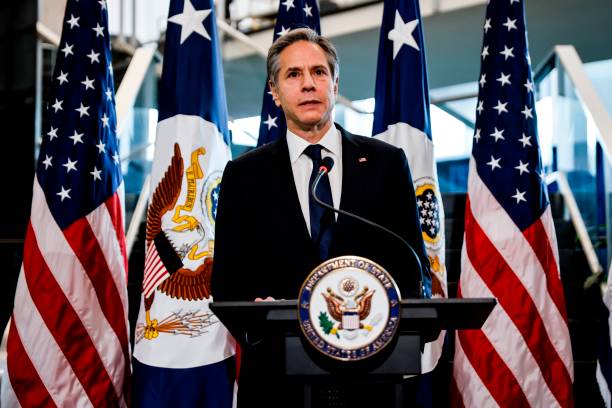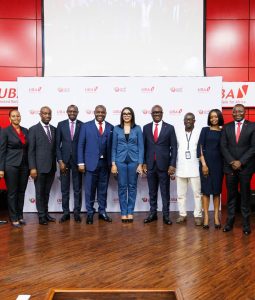
Newly confirmed US Secretary of State Antony Blinken speaks during a welcome ceremony at the State Department in Washington,DC on January 27, 2021. (Photo by CARLOS BARRIA / POOL / AFP) (Photo by CARLOS BARRIA/POOL/AFP via Getty Images)
U.S. Secretary of State Antony Blinken made a show of unity with Middle East allies at a rare Israeli-hosted summit on Monday, hoping to allay their misgivings about an emerging Iranian nuclear deal and Washington’s commitment to the region.
The two-day desert retreat was further clouded by U.S.-Russia tensions over Ukraine, an Islamic State-linked attack in Israel and health worries as Israeli Prime Minister Naftali Bennett was diagnosed with COVID-19 after meeting Blinken.
The foreign ministers of United Arab Emirates, Bahrain and Morocco, which normalised ties with Israel in a 2020 U.S. diplomatic drive, attended the summit in Sde Boker – where the founding Israeli prime minister, David Ben-Gurion, is buried.
Also there was the foreign minister of Egypt, which in 1979 became the first Arab country to make peace with Israel.
“The (region’s) moderates are convening to talk and to form a front against the extremists,” Gil Haskel, an official with Israel’s Foreign Ministry, told public broadcaster Kan, referring to Iran’s hardline Islamist rulers.
“There are nuances, different perspectives being discussed or argued about, there is some agreement about some issues and less so about others – but there’s no doubt in this room around the table that Iran must not be nuclear.”
World powers’ nuclear talks with Iran were close to a deal several weeks ago until Russia made last-minute demands of the United States, insisting sanctions imposed on Moscow over its Ukraine invasion should not affect its trade with Iran.
Speaking in Jerusalem alongside his Israeli counterpart Yair Lapid, Blinken said on Sunday that restoring a 2015 nuclear deal was the best way to rein in Iran’s nuclear programme.
But he added: “When it comes to the most important element, we see eye to eye. We are both committed, both determined that Iran will never acquire a nuclear weapon.”
Iran says its nuclear ambitions are peaceful.
In another sign the allies were closing ranks against Iran, the Israeli ambassador to Manama, Eitan Naeh, said on Monday that Israel will appoint a military attache to the U.S. Navy’s Fifth Fleet headquarters in Bahrain soon.
Blinken has been pressing Arab allies to step up support for Ukraine to fend off Russia’s invasion as several Gulf nations have so far stopped short of providing meaningful assistance. Israel has been trying to mediate an end to the crisis, holding talks with the Russian and Ukrainian leaders.
Blinken on Sunday also met with Palestinian President Mahmoud Abbas in Ramallah, where he voiced continued U.S. commitment to a two-state solution of the Israeli-Palestinian conflict.
However, the prospect of reviving peace talks appears dim and the Palestinians have been angered by the warming of ties between Israel and Arab states in the absence of any progress toward the establishment of an independent Palestinian state.
“Unless the occupation ends, Arab normalization meetings are nothing but an illusion and free reward for Israel,” Palestinian Prime Minister Mohammed Shtayyeh told his cabinet on Monday.
Jordan’s King Abdullah arrived in Ramallah to hold talks with Abbas on Monday, a first such visit in years that was expected to focus on efforts to reduce regional tensions in the ahead of the Muslim holy month of Ramadan.
A State Department spokesman said Blinken would be tested for COVID-19, as he had been in close contact with Bennett. The top U.S. diplomat was spotted jogging outside the Sde Boker summit venue on Monday morning.




探索Telegram的强大功能!访问电报中文版下载,了解其加密聊天、大型群组、频道和Bot生态系统。体验更强大的通讯工具。
探索Telegram的强大功能!访问Telegram中文版,了解其加密聊天、大型群组、频道和Bot生态系统。体验更强大的通讯工具。
Keep functioning ,great job!